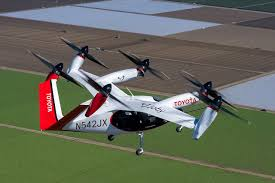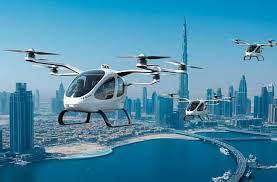Now Reading: “Taxis Coming Soon? Joby Aviation and Dubai Join Forces 2025”
-
01
“Taxis Coming Soon? Joby Aviation and Dubai Join Forces 2025”
“Taxis Coming Soon? Joby Aviation and Dubai Join Forces 2025”

Dubai has always been famous for making the impossible possible. From the world’s tallest building to artificial islands shaped like palm trees, this Middle Eastern city thrives on futuristic ideas. Now, Dubai is ready to add another feather to its cap — flying taxis. Thanks to a groundbreaking partnership with American company Joby Aviation, Dubai’s long-envisioned “Sky City” dream is turning into reality.
Joby Aviation: Leading the Future of Air Mobility

Joby Aviation, based in California, is a leader in the development of electric vertical takeoff and landing (eVTOL) aircraft. These vehicles are designed to take off like helicopters and fly like planes, without producing harmful emissions. Joby’s aircraft are quiet, fast, and efficient, making them perfect for city travel without causing noise or air pollution.
The company’s vision is simple yet ambitious: to make air taxis as common and safe as regular car taxis, reducing traffic jams and slashing commute times. With years of research, strong investor support (including from Toyota and Uber), and successful flight testing, Joby is closer than ever to making flying taxis an everyday reality.
Why Dubai? The Perfect Test Ground for Flying Taxis

Dubai is the ideal partner for Joby Aviation. The city’s leadership has long been keen to embrace smart technology and futuristic transport. In fact, Dubai’s government aims for 25% of all its trips to be autonomous — without a driver or pilot — by 2030. This includes flying taxis as part of its “Sky City” vision, where air mobility will reduce road traffic and improve travel speed within the city.
Dubai’s excellent infrastructure, innovative mindset, and strong government backing make it the perfect place to test and launch this new form of transport. The city has already hosted trials of other air taxi models in the past, but the partnership with Joby Aviation seems to be the most promising yet.
Details of the Partnership: What We Know So Far
Earlier this year, Dubai’s Road and Transport Authority (RTA) signed an exclusive agreement with Joby Aviation. Under this deal, Joby will have the sole right to operate air taxi services in Dubai for six years. This exclusivity means no other company can run similar services during this period.
The plan is to start with pilot operations by 2026. The air taxis will fly between specially designed ‘vertiports’ — takeoff and landing spots — placed in important parts of the city such as Downtown Dubai, Dubai Marina, and near Dubai International Airport. These locations have been carefully selected to connect popular areas with heavy traffic, reducing the time to travel from one part of the city to another from an hour to just a few minutes.
According to Joby Aviation, their eVTOL aircraft can carry four passengers and a pilot, travel up to 160 kilometers on a single charge, and reach speeds of 320 kilometers per hour. These features make it ideal for short urban flights.
The RTA and Joby are also working together to ensure the air taxis are safe, comfortable, and affordable for passengers. Pricing details are still being discussed, but both sides have promised to keep the service as competitive as possible with luxury car services like Uber Black.
What This Means for Dubai’s “Sky City” Vision
The partnership is a major step toward turning Dubai’s Sky City dream into a real, working system. For years, the city has been planning to shift some of its transport system into the air. With road traffic becoming more congested and the population continuing to grow, flying taxis could offer an innovative solution to future mobility problems.
Once fully operational, this air taxi service could save time for busy residents and tourists alike. For example, what is currently a 45-minute car trip from Dubai International Airport to the Palm Jumeirah could take less than 10 minutes by air taxi.
Moreover, this technology could reduce pollution and make the city greener. Because Joby’s aircraft are fully electric, they won’t produce harmful emissions like petrol or diesel cars do. Their quiet design also means they won’t disturb the peace of the city below — an important point in a luxury destination like Dubai.
Challenges Ahead: Not All Smooth Flying
While the partnership is exciting, challenges remain. Air taxi services require careful airspace management to prevent accidents and ensure smooth operations. Dubai’s Civil Aviation Authority and other government agencies will need to build new rules and systems to allow for safe urban air travel.
Infrastructure will also be key. The city needs to build vertiports that can handle passenger flow, charging stations for the aircraft, and maintenance facilities. These projects will require large investments and careful planning.
Public acceptance is another factor. While many people are excited about flying taxis, some may have concerns about safety or cost. Joby and the RTA will need to ensure that the public feels confident in this new mode of transport.
The Global Race for Urban Air Mobility
Dubai is not alone in its quest for flying taxis. Cities like Paris, Los Angeles, and Singapore are also testing eVTOL aircraft. However, Dubai’s strong government support, advanced infrastructure, and tech-friendly policies give it a good chance of being among the first cities in the world to launch commercial air taxi services.
For Joby Aviation, this Dubai deal is a golden opportunity to prove its technology in a real-world setting and win global recognition. If successful, the partnership could open the door for similar projects in other cities across the Middle East, Asia, and beyond.
Conclusion: A Step Toward the Sky
Joby Aviation’s partnership with Dubai marks a big leap toward the future of urban transport. If all goes according to plan, Dubai could soon become the first city in the world with a fully functioning air taxi network — making science fiction a part of everyday life.
The “Sky City” vision that once sounded like a distant dream is fast approaching reality. With flying taxis possibly ready for takeoff by 2026, the world will be watching to see if Dubai can once again redefine what is possible in the modern city.
Read More:- Shobha Realty Launches Its Most Luxurious Project Yet—Full Details Inside 2025





















